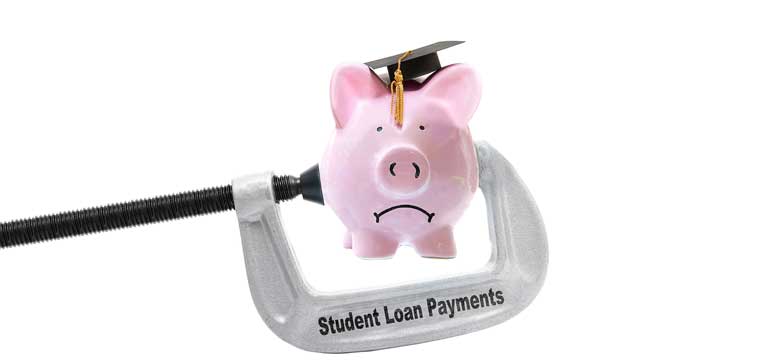 We have all heard the horror stories of college graduates with staggering debt and little hope of repaying it before retiring. The obvious cause of the problem is the seemingly ever-increasing cost of college. But here’s the thing. When you read the stories about graduates struggling with student loans after graduation, you’ll almost always see that they had alternatives to the large student loans they ended up with. With the high cost of college, more than ever teens need their parents to provide financial guidance when applying to college. Unfortunately, rather than supplying a financial reality check, too many parents planning for college make the situation worse by making the following mistakes:
We have all heard the horror stories of college graduates with staggering debt and little hope of repaying it before retiring. The obvious cause of the problem is the seemingly ever-increasing cost of college. But here’s the thing. When you read the stories about graduates struggling with student loans after graduation, you’ll almost always see that they had alternatives to the large student loans they ended up with. With the high cost of college, more than ever teens need their parents to provide financial guidance when applying to college. Unfortunately, rather than supplying a financial reality check, too many parents planning for college make the situation worse by making the following mistakes:
Loans
How Much Should Students Borrow for College?
 Anyone who pays attention to the media has heard the alarming reports about student debt. In the United States student loan debt is about $1.7 trillion which exceeds the total credit card balance. Scary numbers. You would expect the question, “How much should I borrow for college?” to be the question that all students and their families are asking. But I don’t’ think that’s actually the case. Let me explain why.
Anyone who pays attention to the media has heard the alarming reports about student debt. In the United States student loan debt is about $1.7 trillion which exceeds the total credit card balance. Scary numbers. You would expect the question, “How much should I borrow for college?” to be the question that all students and their families are asking. But I don’t’ think that’s actually the case. Let me explain why.
50-50 Highlights: Colleges Where Students Are Most Likely to Graduate with Debt
 In case you’ve been in a coma and haven’t heard, there is a student loan crisis. According to the Federal Reserve Bank of New York, the total student loan debt of $1.46 billion exceeds that of consumer credit card debt. Apparently, students are borrowing too much to pay for college. Of course, you could argue that maybe they’re not borrowing too much, they just don’t have jobs that will allow them to make their loan payments. Either way, it doesn’t change the fact that students are often borrowing more than they can reasonably repay.
In case you’ve been in a coma and haven’t heard, there is a student loan crisis. According to the Federal Reserve Bank of New York, the total student loan debt of $1.46 billion exceeds that of consumer credit card debt. Apparently, students are borrowing too much to pay for college. Of course, you could argue that maybe they’re not borrowing too much, they just don’t have jobs that will allow them to make their loan payments. Either way, it doesn’t change the fact that students are often borrowing more than they can reasonably repay.
50-50 Highlights: Public Universities with Highest Percentage of PLUS Loans by State
 With all the talk about student debt, it’s easy to miss the PLUS loan numbers. PLUS loans are federal loans taken out by parents on the student’s behalf. The really scary thing about PLUS loans is that parents can borrow up to the full amount of tuition. Furthermore, eligibility for PLUS loans isn’t based on ability to repay the loan but rather your credit history. Just think about it, even with a great credit history, a bank won’t loan you money for $250,000 house without some evidence that you can make the payments. The government will.
With all the talk about student debt, it’s easy to miss the PLUS loan numbers. PLUS loans are federal loans taken out by parents on the student’s behalf. The really scary thing about PLUS loans is that parents can borrow up to the full amount of tuition. Furthermore, eligibility for PLUS loans isn’t based on ability to repay the loan but rather your credit history. Just think about it, even with a great credit history, a bank won’t loan you money for $250,000 house without some evidence that you can make the payments. The government will.
50-50 Highlights: Colleges with the Lowest Student Loan Default Rates
 Given that paying for a college education now rivals buying a house, it isn’t surprising the New York Fed reports that “Balances of student loans have eclipsed both auto loans and credit cards, making student loan debt the largest form of consumer debt outside of mortgages.” Faced with limited financial aid and the prospect of the equivalent of a mortgage payment upon graduating from college, families can’t help but ask if “college is worth it?”
Given that paying for a college education now rivals buying a house, it isn’t surprising the New York Fed reports that “Balances of student loans have eclipsed both auto loans and credit cards, making student loan debt the largest form of consumer debt outside of mortgages.” Faced with limited financial aid and the prospect of the equivalent of a mortgage payment upon graduating from college, families can’t help but ask if “college is worth it?”
50-50 Highlights: Colleges Where Parents End Up With Debt
 I’ve mentioned before that not all 50-50 schools are affordable or generous with financial aid. Recently, I’ve started looking at Parent Loans for Undergraduate Students (PLUS) loans. As the name indicates, these loans are usually not taken out by the student but by parents on the student’s behalf. This means that they aren’t generally counted in the student debt statistics because it’s not the student’s debt but the parent’s. And the fact the parents can borrow up to the total cost of attendance each year can make them very dangerous loans.
I’ve mentioned before that not all 50-50 schools are affordable or generous with financial aid. Recently, I’ve started looking at Parent Loans for Undergraduate Students (PLUS) loans. As the name indicates, these loans are usually not taken out by the student but by parents on the student’s behalf. This means that they aren’t generally counted in the student debt statistics because it’s not the student’s debt but the parent’s. And the fact the parents can borrow up to the total cost of attendance each year can make them very dangerous loans.






